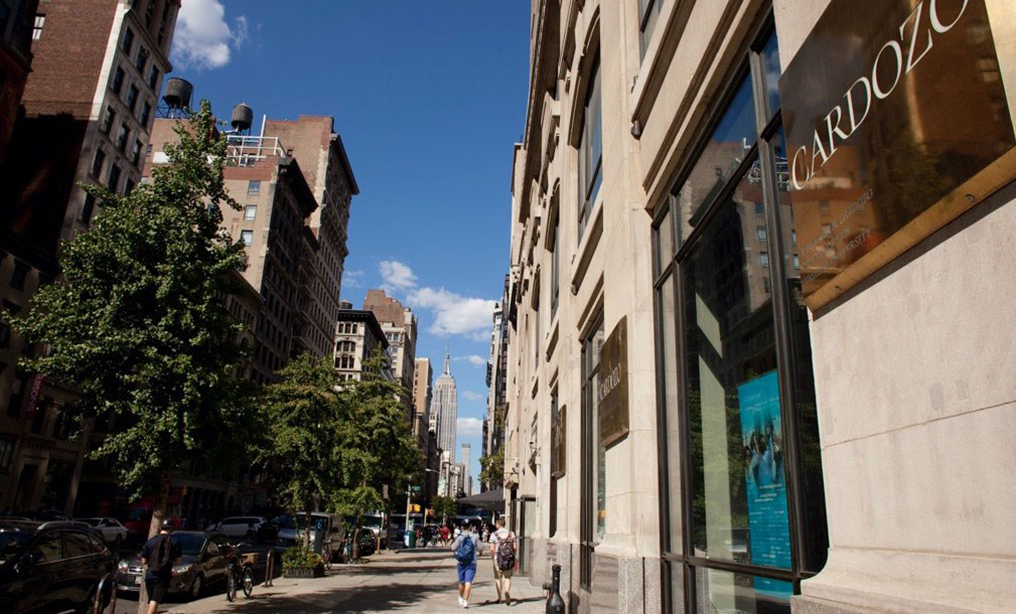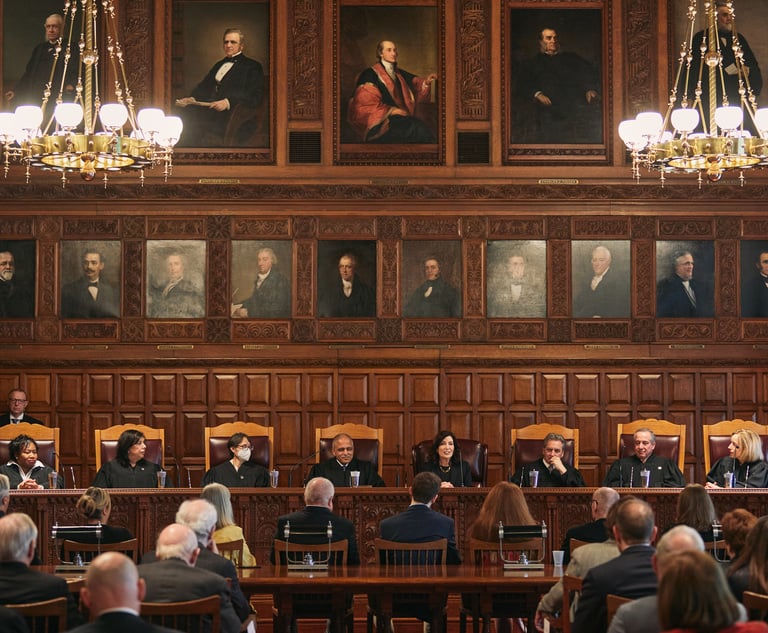Fellow 2020 Law School Graduates: Now Is the Time to Get Involved
It sometimes feels as though we, not-quite-lawyers, have no special part to play during these crises. But as recent law graduates, we have the power and skills necessary to seek justice, promote fairness, and fulfill a special obligation that we have to broader society.
July 28, 2020 at 09:58 AM
5 minute read
 Benjamin N. Cardozo School of Law at Yeshiva University. (Photo: Cardozo School of Law/Facebook)
Benjamin N. Cardozo School of Law at Yeshiva University. (Photo: Cardozo School of Law/Facebook)
We, the tens of thousands who graduated law school in the Class of 2020, completed our legal education at a time of unprecedented crisis. During our final semester, the worst pandemic in more than a century swept through the country. Amid suffering and uncertainty, we found ways to stay connected to one another and to complete our education. Many of us balanced our studies against new obligations: sharing space, caring for our children and our elders, and mourning people we lost. We are proud to be members of a graduating class with so much resilience and poise.
We celebrated graduation while the nation mourned, not just for those lost in the pandemic, but for victims of the systemic killings of Black Americans by law enforcement. As protests erupted across the country, some of us marched or served as legal observers. Others used our platforms, whatever they may be, to spread awareness and seek reform in our communities.
It sometimes feels as though we, not-quite-lawyers, have no special part to play during these crises. As health care providers and other essential workers around us fight on the front lines, some of us feel the only thing we can do to protect our communities is to stay at home. But as recent law graduates, we have the power and skills necessary to seek justice, promote fairness, and fulfill a special obligation that we have to broader society. This health crisis is quickly becoming a legal one; the most vulnerable New Yorkers will look to advocates for help in navigating the aftermath of the pandemic. Additionally, the response to the murder of George Floyd catalyzed a reform movement, which can benefit from the assistance of volunteers able to help analyze law and policy.
It is essential that newly-minted graduates seize this moment and remember why we chose to become members of a profession focused on advocacy, integrity, and diligence. As students, we read case upon case demonstrating just how integral lawyers are to changing methods, systems, and lives. As soon-to-be lawyers, we are empowered with this knowledge and armed with the ability to act as guides to help others interpret and navigate the complexities of the law. As we continue to see shifts in culture and policy, the need to provide legal assistance to underserved communities is paramount to ensure basic needs and rights are protected. We have so much to contribute to this moment.
Accordingly, we ask each of our peers to pledge to complete at least six to 10 pro bono hours between now and the end of the year. Many of us are tired. Most of us are already occupied with studying for the bar exam. But we are all starting legal careers where navigating competing priorities will be central to our work. This is only the beginning of our efforts to balance our commitment to clients, the demands of our personal lives, and the desire to do good for our community. We have no doubt that we will continue to meet the moment—today and in the future.
There are already so many ways to help. Many law schools across the country have started projects aimed at providing legal help for those affected by COVID-19. At Cardozo, we have begun to match recent graduates with COVID-19 pro bono opportunities while raising money for the same legal efforts. Our class has pledged to collectively provide 2020 pro bono hours by the end of the year. We urge recent graduating classes at other schools to make a similar commitment.
For three years, we eagerly awaited our chance to transition from law students to lawyers. Some of us were looking forward to joining a long line of attorneys in our family. Others are the first in our family to attend graduate school. Over the past three years, we had expected that in June 2020 we would have a traditional ceremony, where we would pick our loved ones out in the crowd and know that this moment exceeded their wildest dreams.
The world looks different now; taking part in the pro bono response to the pandemic can be a meaningful and creative way to celebrate our achievements together. But more than that, our country and our communities are asking us to step up, to use our voice and our power, and to help create justice. We are uniquely equipped to take on this work, and there is no time to waste.
Naomi Gallimore, Benjamin Leb, and Destinee Salomon are members of the Class of 2020 at the Benjamin N. Cardozo School of Law at Yeshiva University.
This content has been archived. It is available through our partners, LexisNexis® and Bloomberg Law.
To view this content, please continue to their sites.
Not a Lexis Subscriber?
Subscribe Now
Not a Bloomberg Law Subscriber?
Subscribe Now
NOT FOR REPRINT
© 2025 ALM Global, LLC, All Rights Reserved. Request academic re-use from www.copyright.com. All other uses, submit a request to [email protected]. For more information visit Asset & Logo Licensing.
You Might Like
View All
Jimmy Carter’s 1974 Law Day Speech: A Call for Lawyers to Do the Public Good
14 minute readTrending Stories
Who Got The Work
Michael G. Bongiorno, Andrew Scott Dulberg and Elizabeth E. Driscoll from Wilmer Cutler Pickering Hale and Dorr have stepped in to represent Symbotic Inc., an A.I.-enabled technology platform that focuses on increasing supply chain efficiency, and other defendants in a pending shareholder derivative lawsuit. The case, filed Oct. 2 in Massachusetts District Court by the Brown Law Firm on behalf of Stephen Austen, accuses certain officers and directors of misleading investors in regard to Symbotic's potential for margin growth by failing to disclose that the company was not equipped to timely deploy its systems or manage expenses through project delays. The case, assigned to U.S. District Judge Nathaniel M. Gorton, is 1:24-cv-12522, Austen v. Cohen et al.
Who Got The Work
Edmund Polubinski and Marie Killmond of Davis Polk & Wardwell have entered appearances for data platform software development company MongoDB and other defendants in a pending shareholder derivative lawsuit. The action, filed Oct. 7 in New York Southern District Court by the Brown Law Firm, accuses the company's directors and/or officers of falsely expressing confidence in the company’s restructuring of its sales incentive plan and downplaying the severity of decreases in its upfront commitments. The case is 1:24-cv-07594, Roy v. Ittycheria et al.
Who Got The Work
Amy O. Bruchs and Kurt F. Ellison of Michael Best & Friedrich have entered appearances for Epic Systems Corp. in a pending employment discrimination lawsuit. The suit was filed Sept. 7 in Wisconsin Western District Court by Levine Eisberner LLC and Siri & Glimstad on behalf of a project manager who claims that he was wrongfully terminated after applying for a religious exemption to the defendant's COVID-19 vaccine mandate. The case, assigned to U.S. Magistrate Judge Anita Marie Boor, is 3:24-cv-00630, Secker, Nathan v. Epic Systems Corporation.
Who Got The Work
David X. Sullivan, Thomas J. Finn and Gregory A. Hall from McCarter & English have entered appearances for Sunrun Installation Services in a pending civil rights lawsuit. The complaint was filed Sept. 4 in Connecticut District Court by attorney Robert M. Berke on behalf of former employee George Edward Steins, who was arrested and charged with employing an unregistered home improvement salesperson. The complaint alleges that had Sunrun informed the Connecticut Department of Consumer Protection that the plaintiff's employment had ended in 2017 and that he no longer held Sunrun's home improvement contractor license, he would not have been hit with charges, which were dismissed in May 2024. The case, assigned to U.S. District Judge Jeffrey A. Meyer, is 3:24-cv-01423, Steins v. Sunrun, Inc. et al.
Who Got The Work
Greenberg Traurig shareholder Joshua L. Raskin has entered an appearance for boohoo.com UK Ltd. in a pending patent infringement lawsuit. The suit, filed Sept. 3 in Texas Eastern District Court by Rozier Hardt McDonough on behalf of Alto Dynamics, asserts five patents related to an online shopping platform. The case, assigned to U.S. District Judge Rodney Gilstrap, is 2:24-cv-00719, Alto Dynamics, LLC v. boohoo.com UK Limited.
Featured Firms
Law Offices of Gary Martin Hays & Associates, P.C.
(470) 294-1674
Law Offices of Mark E. Salomone
(857) 444-6468
Smith & Hassler
(713) 739-1250









